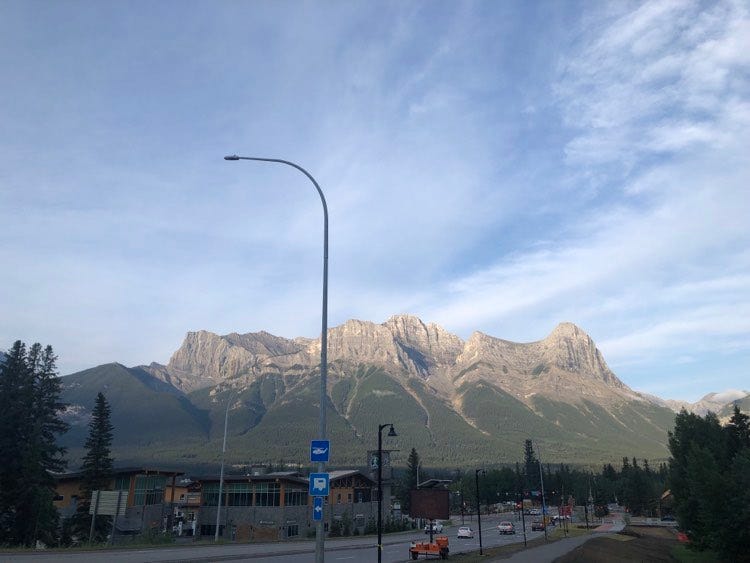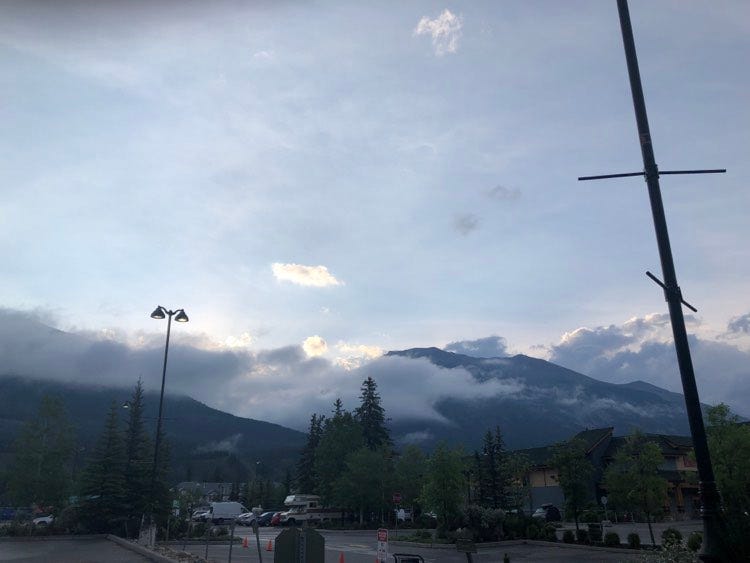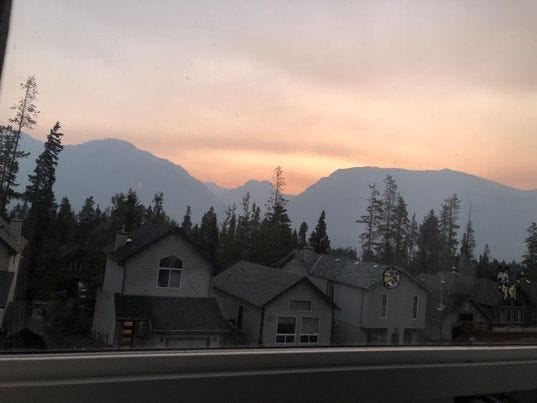Happy Saturday!
I hope you’re having a beautiful start to your weekend.
What I’ve been up to:
I wrote a short essay on solitude and togetherness. Connection isn't a topic I've explored much in my writing, so it was a lot of fun.
I flew to Alberta early Wednesday morning for two weeks of backcountry hiking in the Rocky Mountains. I’m spending two days in beautiful Canmore with family, before heading into the mountains with my brother and a friend.
Here are the most interesting ideas I've explored this week.
✍️ quote i’m pondering:
Spiritual teacher Ram Dass on bearing the burden of being:
“You can do it like it’s a great weight on you, or you can do it like a dance.”
📚 book passage i loved:
For still there are so many things
that I have never seen:
in every wood in every spring
there is a different green.
I sit beside the fire and think
of people long ago,
and people who will see a world
that I shall never know.
― The Fellowship of the Ring by J.R.R. Tolkien
💡 idea from me: notes on money
August 7, 2023 — 6am
Driving through the West Virginia mountains, I started talking with J about money as the sun crept above the trees.
Initially, like many young ambitious people my age, I wanted to be rich. I wanted a mansion, a fortress of blue Italian suits, an AMEX platinum card, a Rolls-Royce, maybe a villa in Spain. Just the basics, you know?
I made decisions that oriented me toward a high-income career. (Although money wasn't my motivator, status was.)
Then, at some point in 2021, I fell into the camp of "I don't need money and people who want to get rich are chasing the wrong things and it won’t make them happy and I know better".
Maybe it was Seneca brainwashing me (although turns out he was a hypocrite... Seneca was loaded).
I realized I don't need to be rich--and probably won't be--to live a good life. I pivoted away from a high-income path to pursue what felt like a calling. Namely, writing.
This year my perspective has changed. There's nothing wrong with wanting to get rich. Done ethically, it’s better than chasing status. I actually think accumulating a lot of money early on in life can expedite the process of finding peace.
If I start a family one day, I want to be able to provide. Part of that is making a sturdy income. I've felt a bit selfish in my decision to "pursue a calling". It feels millennial, detached from reality.
Money is also a powerful tool to create experiences that bring joy to others which brings joy to me. I've felt glimmers of it when I bring friends to my cottage.
As my friend Silvio Castelletti writes:
The only idea of happiness that consistently works for me is making someone happy. Or just knowing that someone I care for is happy. It’s happiness by reflection. Borrowed happiness. And that’s all I need: borrowing back a little of the happiness that I’d help generate, or that someone I love has.
I still hold onto fantasies of taking my brother and sister on a vacation or having a big property where my family can commune and spend quality time together or funding a project that makes someone’s dream come to life.
okay here comes the help-self part:
I was obsessed with money, finance, and investing for three years.
I realized I have many thoughts about money I think are worth sharing. Hopefully one or two are insightful.
Here are my notes on money:
90% of personal finance can be boiled down to: spend less than you make, save the difference, invest consistently in broad-based index ETFs with low fees.
Choosing to be joyfully unoptimized in my finances freed up a lot of time and mental energy to invest in things I care more about (writing, reading, meditation, etc.)
Lifestyle creep (upgrading your lifestyle proportionately with increases in income) should be avoided at all costs. Keep your personal burn rate low.
I have a sneaking suspicion that you have to make a lot of money (or spend time around rich people) before you actually believe money doesn’t buy happiness.
Whether or not money can buy happiness, it can buy freedom. The best reason to accumulate wealth is to buy yourself freedom from anything you don’t want to do, and freedom to do things you do want to do. Morgan Housel: Money’s greatest intrinsic value is its ability to give you control over your time.
Money won’t solve all your problems but it will solve all your money problems. Then you’re left with only problems money won’t solve.
People can be incredibly intelligent academically or professionally, but incredibly stupid with their own money. (Even if they work in finance.)
All the super-rich old people wish they were young and broke again.
Being poor is not having little, but wanting more.
Financial freedom is less about making all the right moves and more about avoiding big mistakes (i.e. car, house, partner, get-rich-quick schemes).
Avoid get-rich-quick schemes. There are no get-rich-quick schemes. That's just someone else getting rich off you.
Avoid big crazes. The more FOMO you have about missing out, the more you should avoid it. The more aggressively someone tries to convince you they're right, the more insecure they are about their belief (and thus seeking validation).
FOMO is a terrible emotion to let affect financial decisions (spending or investing).
You don’t have to make money back how you lost it.
You probably inherited your money habits from your parents. If you want a different outcome, you need different habits.
Always have a bit of cash in your wallet. You never know when you'll need it. (Says my Dad).
Focusing too much on money can lead to making less money.
Set aside a % of your money into a separate "Dumb Mistakes" savings account. Next time you lose or break or damage something, pay for it through the account and forgive yourself.
Will Durant: Don't let restaurants lure you; they are the vampires of the stomach; they will burden your flesh in proportion as they tighten your purse.
Inheritance makes people do crazy things.
Lack of money is stressful. Studies show economic stress impedes cognitive bandwidth. Do whatever you have to do to not worry about money. Sam Altman: having enough money so that you don’t stress about paying rent does more to change your well-being than having enough money to buy your own jet.
My north star is to have enough money that I don’t worry about money. (Although I've met middle-aged men with a lot of money who say the same thing).
on spending:
My most trusty spending rule: wait a week and see if I still want it.
Buying something to remove a negative will make you happier than buying something to add a positive.
Spend lavishly on what you love, cut ruthlessly on everything else.
A scarcity mindset is independent of income. There are multi-millionaires who don't let themselves buy Greek yogurt.
Don't buy things to impress other people. It doesn't work.
Allow yourself to spend more money than you're comfortable with on cool experiences. Especially if you can't do them when you're older. Sam Altman: in your 20s, I think it’s ok to take a “Give me financial discipline, but not just yet” attitude. All the money in the world will never get back time that passed you by.
Spending money on experiences isn't always better. Try spending money on different oddball things and find what brings you joy.
The more you hate your job, the more of your paycheck you'll feel justified spending.
Every time we spend money, we make a statement about what we value. There’s no clearer indication.
Things you use for a significant fraction of your life (bed: 1/3rd, office-chair: 1/4th) are worth investing in.
When buying things, time and money trade off against each other. If you’re low on money, take more time to find deals (sales, in-store specials, buying used, hacks, etc). If you’re low on time, just buy things quickly online.
Buy most things used. You save money and the environment.
Buying high-quality is better for the planet than buying low-quality. But, buying nothing is best of all.
on investing:
The best investments are “buy and forget.”
People forget to factor in the time and the psychological toll of investments. Daily stress and 15 minutes reading reports every evening may not be worth the extra 1-2% return.
98% of people should not invest in stocks. The 2% who should are not legally allowed to.
on real estate:
Buying isn't always better than renting. A lot of people have been financially ruined from buying. They just don't sell courses about it. Do the math yourself (and include opportunity cost).
Rule of thumb: buy if you're *pretty certain* you'll stay for at least 5-10 years.
Buying can make you fragile, while renting can make you antifragile.
"Lock it and leave it" flexibility is huge if you travel often.
and finally:
Personal finances are personal. Everyone has different definitions, goals, risk tolerances. You probably shouldn't take financial advice from most people. Especially people on the Internet :)
❓ question i’m asking:
How much of what I want is on the other side of a few hard conversations?
📸 photo of the week:
A lot of people know Banff, but Canmore is a hidden gem.
Thank you for reading! It means a lot to me :)
Spread the love—If you want to support my work, the best way to do so is by sharing it with others who would enjoy it.
Beyond that, click the ❤️ button on this post so more people can discover it.
Get in touch—If my writing resonated or if you just want to be friends, please reach out 😊 Reply to this email, leave a comment, or find me on Twitter!
With love,
Tommy






Fabulous writing! Thank you for sharing your insights. I loved these very concrete money-related notes too, after the more philosophical and meta writings.
Now I'm curious on your take on who should be trading stocks: who are the 2% of people who are not legally allowed to? 160 million sounds a bit too much for convicted fraudsters. Or do you mean the people who are inside the given businesses?
In any case, the ideas really resonated with me too; I've been having some internal ponderings along similar lines. You collected and phrased these ideas wonderfully.
Wish you a great rest of your August!
I agree so much with your notes on money. Morgan Housel, Ramit Sethi... I'm glad there are people out there (such as yourself) that share similar views on money as I do :)